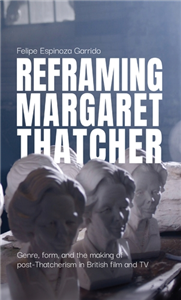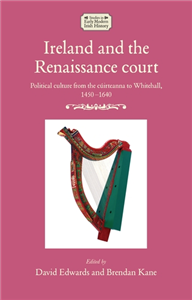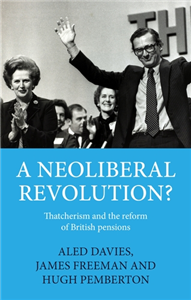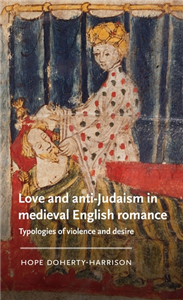Your Search Results
-
Penned in the Margins
Penned in the Margins creates award-winning publications and performances for people who are not afraid to take risks. From modest beginnings as a reading series in a converted railway arch in south London, Penned in the Margins has grown over the last 15 years into an award-winning independent publisher of poetry, fiction, non-fiction and cross genre work. "A marvellously exciting venture, bringing together the worlds of experimentalism and performance, always looking for new ways to present the spoken and written word in a time of artistic flux. The mainstream will, in the future, be redefined and enriched by companies like Penned in the Margins." Ian McMillan, poet and broadcaster
View Rights Portal
-
Promoted ContentThe ArtsMay 2026
Reframing Margaret Thatcher
Genre, form, and the making of post-Thatcherism in British film and TV
by Felipe Espinoza Garrido
Against the backdrop of Britain's historically anti-Thatcherite films of the 1980s and 1990s, Reframing Margaret Thatcher outlines a decisive shift in the collective imagination of Thatcher. Drawing on genre, trauma, and queer studies, it demonstrates how post-Thatcherite films reflect upon their own entanglement in the polarization of the Thatcher years but also rewrite the clichéd Iron Lady. Chapters on The Iron Lady, This is England, Doomsday, 9 Dead Gay Guys, and the Sherlock TV series investigate various Thatcher imaginations, ranging from Thatcher as a lesbian mob boss, as prime minister in apocalyptic England, to Thatcher as an empty bust. This innovative study shows how the apparent depoliticization of British film makes visible new relations between genre, cinematic form, and imaginations of the past and offers fresh perspectives that both critique and reinterpret Thatcher's enduring impact.
-
Promoted ContentBusiness, Economics & LawFebruary 2017
Judges, politics and the Irish Constitution
by Edited by Laura Cahillane, James Gallen, Tom Hickey
This volume brings together academics and judges to consider ideas and arguments flowing from the often complex relationships between law and politics, adjudication and policy-making, and the judicial and political branches of government. Contributors explore numerous themes, including the nature and extent of judicial power, the European Court of Human Rights decision in O'Keeffe v Ireland, the process of appointing judges and judicial representation, judicial power and political processes. Contrasting judicial and academic perspectives are provided on the role of the European Court of Human Rights and the nature of exhausting domestic remedies, including a contribution from the late Mr. Justice Adrian Hardiman. The role of specific judges, social and political disputes and case law are examined and socio-economic rights, the rule of law and electoral processes are all addressed.
-
 Trusted Partner
Literature & Literary StudiesNovember 2018
Trusted Partner
Literature & Literary StudiesNovember 2018Contemporary Chaucer across the centuries
by Helen Hickey, Anne McKendry, Melissa Raine, Anke Bernau
-
 Trusted Partner
Literature & Literary StudiesJuly 2015
Trusted Partner
Literature & Literary StudiesJuly 2015Margaret Cavendish
by Emma Rees
Margaret Cavendish was one of the most prolific, complex and misunderstood writers of the seventeenth century. A contemporary of Descartes and Hobbes, she was fascinated by philosophical, scientific and imaginative advances, and struggled to overcome the political and cultural obstacles which threatened to stop her engagement with such discourses. Emma Rees examines how Cavendish engaged with the work of thinkers such as Lucretius, Plato, Homer and Harvey in an attempt to write her way out of the exile which threatened not only her intellectual pursuits but her very existence. What emerges is the image of an intelligent, audacious and intrepid early modern woman whose tale will appeal to specialists and general readers alike. ;
-
 Trusted Partner
Trusted Partner
-
 Trusted Partner
Political science & theoryJuly 2015
Trusted Partner
Political science & theoryJuly 2015The political theory of the Irish Constitution
by Eoin Daly, Tom Hickey
-
 Trusted Partner
Political science & theoryJuly 2015
Trusted Partner
Political science & theoryJuly 2015The political theory of the Irish Constitution
Republicanism and the basic law
by Eoin Daly, Tom Hickey
The political theory of the Irish Constitution considers Irish constitutional law and the Irish constitutional tradition from the perspective of Republican theory. It analyses the central devices and doctrines of the Irish Constitution - popular sovereignty, constitutional rights and judicial review - in light of Republican concepts of citizenship and civic virtue. The Constitution, it will argue, can be understood as a framework for promoting popular participation in government as much as a mechanism for protecting individual liberties. It will be of interest to students and researchers in Irish politics, political theory and constitutional law, and to all those interested in political reform and public philosophy in Ireland.
-
 Trusted Partner
Literature & Literary StudiesJune 2026
Trusted Partner
Literature & Literary StudiesJune 2026Contemporary Chaucer across the centuries
by Helen Hickey, Anne McKendry, Melissa Raine
This unique and exciting collection, inspired by the scholarship of literary critic Stephanie Trigg, offers cutting-edge responses to the writings of Geoffrey Chaucer for the current critical moment. The chapters are linked by the organic and naturally occurring affinities that emerge from Trigg's ongoing legacy; containing diverse methodological approaches and themes, they engage with Chaucer through ecocriticism, medieval literary and historical criticism, and medievalism. The contributors, trailblazing international specialists in their respective fields, honour Trigg's distinctive and energetic mode of enquiry (the symptomatic long history) and intellectual contribution to the humanities. At the same time, their approaches exemplify shifting trends in Chaucer scholarship. Like Chaucer's pilgrims, these scholars speak to and alongside each other, but their essays are also attentive to 'hearing Chaucer speak' then, now and in the future.
-
 Trusted Partner
Humanities & Social SciencesFebruary 2017
Trusted Partner
Humanities & Social SciencesFebruary 2017Judges, politics and the Irish Constitution
by Laura Cahillane, James Gallen, Tom Hickey
-
 Trusted Partner
Children's & YAAugust 2020
Trusted Partner
Children's & YAAugust 2020Cryptos
by Poznanski, Ursula
Where do we go when Nowhere is the only destination left? Kerrybrook is Jana‘s favourite virtual escape. An idyllic fishing village with beautiful nature and, every now and then, a breeze of fresh air from the nearby sea. Jana, is this world‘s designer and person in power, she’s satisfied with her masterpiece. Best job so far. Until one day, a dead body is found, in both, ’Virtual Reality‘ and the real world. In times of climate change, VR is the only safe place for humankind. That‘s why Jana needs to solve the crime, she’s responsible for stopping the destruction. • CliFi Thriller (Climate Fiction): Climate change & virtual reality • For fans of Black Mirror (Netflix) • All age readers • Strong, female protagonist • Highly relevant topic WHITE RAVENS recommendation (2021): "In the not too distant future, the world is an inhospitable place: droughts, storms, floods. That’s why world designers construct »alternative realities«, such as landscapes populated by dinosaurs, life at court in the Middle Ages, and surfing and chilling out on a beach. People can switch between these worlds at will and, when they die there, they are not truly dead; instead, they merely return to the »real world« – same as at night when they sleep. Then they are reunited with their body, which is lying inside a capsule. In »Cryptos«, Ursula Poznanski pulls out all the stops of storytelling: She embeds numerous references to human and intellectual history in an action-packed and extremely suspenseful thriller plot. In the process, she raises central existential and ontological questions that result from the interplay between the real and the virtual worlds. This complex dystopian novel is narrated in such an enjoyable way that readers will hardly notice their brains going into overdrive as they devour it."
-
 Trusted Partner
Humanities & Social SciencesAugust 2024
Trusted Partner
Humanities & Social SciencesAugust 2024Ireland and the Renaissance court
by David Edwards, Brendan Kane
Ireland and the Renaissance court is an interdisciplinary collection of essays exploring Irish and English courts, courtiers and politics in the early modern period, c. 1450-1650. Chapters are contributed by both established and emergent scholars working in the fields of history, literary studies, and philology. They focus on Gaelic cúirteanna, the indigenous centres of aristocratic life throughout the medieval period; on the regnal court of the emergent British empire based in London at Whitehall; and on Irish participation in the wider world of European elite life and letters. Collectively, they expand the chronological limits of 'early modern' Ireland to include the fifteenth century and recreate its multi-lingual character through exploration of its English, Irish and Latin archives. This volume is an innovative effort at moving beyond binary approaches to English-Irish history by demonstrating points of contact as well as contention.
-
 Trusted Partner
Literature & Literary StudiesJanuary 2014
Trusted Partner
Literature & Literary StudiesJanuary 2014Court and civic society in the Burgundian Low Countries c.1420–1530
by Andrew Brown, Graeme Small
This volume is the first ever attempt to unite and translate some of the key texts which informed Johan Huizinga's famous study of the Burgundian court, The Waning of the Middle Ages, a work which has never gone out of print. It combines these texts with sources that Huizinga did not consider, those that illuminate the wider civic world that the Burgundian court inhabited and the dynamic interaction between court and city. Through these sources, and an introduction offering new perspectives on recent historiography, the book tests whether Huizinga's controversial vision of the period still stands. Covering subjects including ceremonial events, such as the spectacles and gargantuan banquets that made the Burgundian dukes the talk of Europe, the workings of the court, and jousting, archery and rhetoric competitions, the book will appeal to students of late medieval and early modern Europe and to those with wider interests in court culture, ritual and ceremony.
-
 Trusted Partner
Trusted Partner
-
 Trusted Partner
Business, Economics & LawMay 2020
Trusted Partner
Business, Economics & LawMay 2020Medicine, patients and the law
Sixth edition
by Margaret Brazier, Emma Cave
Embryo research, cloning, assisted conception, neonatal care, saviour siblings, organ transplants, drug trials - modern developments have transformed the field of medicine almost beyond recognition in recent decades and the law struggles to keep up. In this highly acclaimed and very accessible book, now in its sixth edition, Margaret Brazier and Emma Cave provide an incisive survey of the legal situation in areas as diverse as fertility treatment, patient consent, assisted dying, malpractice and medical privacy. The book has been fully revised and updated to cover the latest cases, from assisted dying to informed consent; legislative reform of the NHS, professional regulation and redress; European regulations on data protection and clinical trials; and legislation and policy reforms on organ donation, assisted conception and mental capacity. Essential reading for healthcare professionals, lecturers, medical and law students, this book is of relevance to all whose perusal of the daily news causes wonder, hope and consternation at the advances and limitations of medicine, patients and the law.
-
 Trusted Partner
Medical & healthcare lawAugust 2016
Trusted Partner
Medical & healthcare lawAugust 2016Medicine, patients and the law
Sixth edition
by Margaret Brazier. Series edited by Simona Giordano
Embryo research, cloning, assisted conception, neonatal care, saviour siblings, organ transplants, drug trials - modern developments have transformed the field of medicine almost beyond recognition in recent decades and the law struggles to keep up. In this highly acclaimed and very accessible book, now in its sixth edition, Margaret Brazier and Emma Cave provide an incisive survey of the legal situation in areas as diverse as fertility treatment, patient consent, assisted dying, malpractice and medical privacy. The book has been fully revised and updated to cover the latest cases, from assisted dying to informed consent; legislative reform of the NHS, professional regulation and redress; European regulations on data protection and clinical trials; and legislation and policy reforms on organ donation, assisted conception and mental capacity. Essential reading for healthcare professionals, lecturers, medical and law students, this book is of relevance to all whose perusal of the daily news causes wonder, hope and consternation at the advances and limitations of medicine, patients and the law.
-
 Trusted Partner
Literary studies: c 1500 to c 1800November 2011
Trusted Partner
Literary studies: c 1500 to c 1800November 2011The Humorous Magistrate (Arbury)
by Edited by Margaret Jane Kidnie
The Humorous Magistrate is a seventeenth-century satiric comedy extant in two highly distinctive manuscripts. This, the earliest and clearly working draft of the play is bound with three other plays (including The Emperor's Favourite, published by the Malone Society in 2010) in a volume in the library of the Newdigate family of Arbury Hall, Nuneaton, Warwickshire. The second version, showing yet another stage of revision not found in the Arbury manuscript and orientated towards performance, was purchased by the University of Calgary from the English antiquarian Edgar Osborne in 1972. The relationship between the manuscripts was discovered in 2005. The anonymous play has been attributed to John Newdigate III (1600-1642). Like The Emperor's Favourite, it takes aim at the court; its particular object of satire is governmental strategies under the Personal Rule of Charles I. The play appears in print for the first time in these separate editions. The volumes are illustrated with several plates, some provided for comparative purposes.
-
 Trusted Partner
Humanities & Social SciencesJuly 2024
Trusted Partner
Humanities & Social SciencesJuly 2024A neoliberal revolution?
Thatcherism and the reform of British pensions
by Hugh Pemberton, James Freeman, Aled Davies
This book examines the Thatcher government's attempt to revolutionise Britain's pensions system in the 1980s and create a nation of risk-taking savers with an individual stake in capitalism. Drawing upon recently-released archival records, it shows how the ideas motivating these reforms journeyed from the writings of neoliberal intellectuals into government and became the centrepiece of a plan to abolish significant parts of the UK's welfare state and replace these with privatised personal pensions. Revealing a government that veered between political caution and radicalism, the book explains why this revolution failed and charts the malign legacy left by the evolutionary changes that ministers salvaged from the wreckage of their reforms. The book contributes to understanding of policy change, Thatcherism, and international neoliberalism by showing how major reforms to social security could reflect neoliberal thought and yet profoundly disappoint their architects.
-
 Trusted Partner
Business, Economics & LawOctober 2016
Trusted Partner
Business, Economics & LawOctober 2016Medicine, patients and the law
Sixth edition
by Margaret Brazier, Emma Cave, Rebecca Bennett, Simona Giordano
Embryo research, cloning, assisted conception, neonatal care, saviour siblings, organ transplants, drug trials - modern developments have transformed the field of medicine almost beyond recognition in recent decades and the law struggles to keep up. In this highly acclaimed and very accessible book, now in its sixth edition, Margaret Brazier and Emma Cave provide an incisive survey of the legal situation in areas as diverse as fertility treatment, patient consent, assisted dying, malpractice and medical privacy. The book has been fully revised and updated to cover the latest cases, from assisted dying to informed consent; legislative reform of the NHS, professional regulation and redress; European regulations on data protection and clinical trials; and legislation and policy reforms on organ donation, assisted conception and mental capacity. Essential reading for healthcare professionals, lecturers, medical and law students, this book is of relevance to all whose perusal of the daily news causes wonder, hope and consternation at the advances and limitations of medicine, patients and the law.
-
 Trusted Partner
Humanities & Social SciencesJune 2026
Trusted Partner
Humanities & Social SciencesJune 2026A neoliberal revolution?
Thatcherism and the reform of British pensions
by Aled Davies, James Freeman, Hugh Pemberton
This book examines the Thatcher government's attempt to revolutionise Britain's pensions system in the 1980s and create a nation of risk-taking savers with an individual stake in capitalism. Drawing upon recently-released archival records, it shows how the ideas motivating these reforms journeyed from the writings of neoliberal intellectuals into government and became the centrepiece of a plan to abolish significant parts of the UK's welfare state and replace these with privatised personal pensions. Revealing a government that veered between political caution and radicalism, the book explains why this revolution failed and charts the malign legacy left by the evolutionary changes that ministers salvaged from the wreckage of their reforms. The book contributes to understanding of policy change, Thatcherism, and international neoliberalism by showing how major reforms to social security could reflect neoliberal thought and yet profoundly disappoint their architects.
-
 Trusted Partner
Literature & Literary StudiesSeptember 2025
Trusted Partner
Literature & Literary StudiesSeptember 2025Love and anti-Judaism in medieval English romance
Typologies of violence and desire
by Hope Doherty-Harrison
Love and anti-Judaism is a new examination of medieval romance for the questions it poses of the most significant events in Christian history. Providing new readings of Sir Gawain and the Green Knight, Sir Orfeo, Sir Gowther and Sir Amadace, the book argues that romance explores depictions of love-and the sacrifices it may necessitate-in the Hebrew Bible, especially where they do not easily fit into interpretations asserting that this history must prefigure Christ and the crucifixion. An examination of anti-Judaism as a discourse of violence and desire that could be turned inwardly to expose the irresolution in Christianity, this book will provoke new investigations into the religious crises of medieval romance.
























